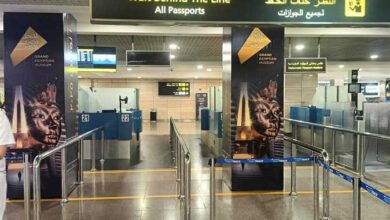No one hates stability, security and calm, but true stability comes from a clarity of vision, a general sense of justice and a confidence that the future will bring with it freedom and progress, rather than being imposed through tyranny. Let us not forget that the Mubarak regime ruled us for 30 years under the pretense of “stability and continuity”; the former it transformed into rigidity and the latter into permanent presidency. We should not ignore history, which teaches us that the word “stability” has always been used as a magical term for the counter-revolution.
The Advisory Council may be nothing more than a balcony from which the Supreme Council of the Armed Forces (SCAF) takes a bolder look at civilian life. Or perhaps it is a bridge between two different political systems, or a safety net that will allow the generals a safe and gradual exit from power. They may also use it as an alternative to parliament, which is already suffering from “manufacturing flaws”. The worst option is that it may become a wall to hide behind while they plan in the dark what they failed to plan in broad daylight, or a thick rope with which to hang the revolution and revolutionaries.
The conflicting statements made by members of the SCAF may be the result of the personal assessments and evaluations of each member to the events on the ground. This may be part of the classic good cop, bad cop routine, whereby someone launches a test balloon, and if it meets with an angry reaction, someone else extinguishes the anger. There may be two wings within the SCAF, which may explain the nature of its current and future political role. In any case, the SCAF has no right to get upset over the reactions, no matter how severe or scathing, so long as it insists on remaining in the “quagmire of politics”, even if for only a temporary period.
A constitution written by a majority will most definitely be amended or replaced by a different majority in the future. Therefore, it is best for all political currents to open-mindedly move towards a consensus concerning the new constitution. They should bear in mind that a true, lasting and modern constitution is one considered by the regular citizen — whatever his class, religion, race, accent, ideology or sex — to have been written with the intention of protecting his/her rights and dignity, and of defending his/her interests.
In the novel "Children of Gabalawi", Arafa, who symbolizes modern science, fails to control the course of events after Gabalawi kills “religion”. He finds himself in need of religion in order to keep things on the right path. The novel’s clear message is that “religion is indispensable in this life.” In the novel "Ibn Fatouma’s Journey", the main character comes to the conclusion that the answer lies in identifying the Divine Self. In “al-Harafeesh”, the moral of the story is the search for justice. While, in "Cairo 30", we read about the more mature and disciplined Maamoon, a member of the Muslim Brotherhood. This is how Naguib Mahfouz wrote, only to be accused of evil and being immoral by an ignorant few. They were ruthless during his life and after his death. Ignorance is truly an affliction.
Women’s lines outside of the polling stations were much longer than the men’s lines, and yet woman do not win the seats. It's a mystery on which I have many theories, but I want to hear an explanation for this painful phenomenon from you.
Anyone sending in the military police, or any other military units, to confront peaceful protesters is gambling with Egypt’s security and future, and will bear responsibility before God and the homeland for the serious consequences that will result from the armed forces' mistake of entering the political swamp.
Oh, how I long for the virtue of self-denial for the sake of general interest. This value and obligation is currently missing from the actions of movements, parties, activists, and public figures, with a few exceptions.
When I leave my apartment I leave with hope, but at the end of the day I come home filled with sadness at the site of a poster with the faces of the martyrs, which my wife hung on the door in February. I look at their faces and with all my heart I tell them I will never betray them, even if it means joining them.
Everywhere I go, I hear people chanting: “It’s the same gang… They removed thieves only to bring in others”.
Translated from Al-Masry Al-Youm



